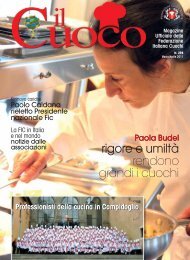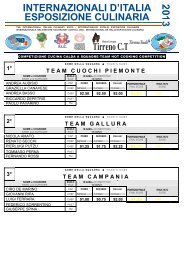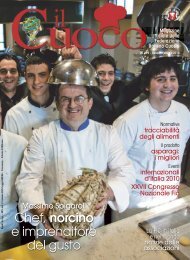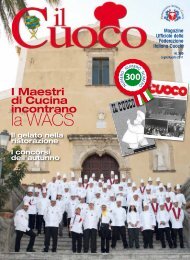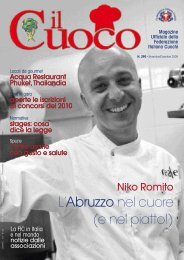Scarica versione PDF - Federazione Italiana Cuochi
Scarica versione PDF - Federazione Italiana Cuochi
Scarica versione PDF - Federazione Italiana Cuochi
Create successful ePaper yourself
Turn your PDF publications into a flip-book with our unique Google optimized e-Paper software.
ILCUOCOINTERNATIONAL<br />
SEE PAGE 3<br />
FOR THE ITALIAN TEXT<br />
F.I.C.<br />
Promotion<br />
has been<br />
launched<br />
by Paolo Caldana<br />
national President of FIC<br />
I would like to extend my wholehearted<br />
thanks to you all, who have believed in this important<br />
project and who have given definitive<br />
approval for the creation of “Fic Promotion”.<br />
Finally the <strong>Federazione</strong> <strong>Italiana</strong> <strong>Cuochi</strong> is<br />
looking to the future. It is adapting to the<br />
times, as the other Associations in the category<br />
have been doing for some time and is<br />
making this one of its common strong points<br />
in order to be important within the great food<br />
and wine world.<br />
FIC is proud of its past and the goals it has<br />
achieved up to now, but from today it is organising<br />
itself to face future challenges and<br />
market requests as best as possible. It is in this<br />
direction that modernisation forces us to<br />
move and FIC must be ready to give positive<br />
and reliable answers on all fronts and in respect<br />
of the times.<br />
Firstly, growth must be professional and of<br />
a high standard in terms of the association,<br />
really looking at the problems of the category<br />
and resolving them positively, bearing in<br />
mind that what keeps FIC together is what<br />
makes all of those who play an active part in<br />
it proud.<br />
Secondly, it was time that FIC “also” became<br />
an entrepreneurial company which<br />
could be the channel through which professional<br />
value could be valorised together with<br />
the quality of services and the ethics which the<br />
FIC brand represents in Italy and in the<br />
world.<br />
Fic Promotion: the reasons behind it, the<br />
aims and the objectives. To give greater<br />
transparency to the administrative, fiscal<br />
and legal part; to give value, soundness,<br />
quality and professionalism to the FIC organisation<br />
chart; to achieve a wider visibility<br />
in the cultural, professional and commercial<br />
sector; to promote and publicise products<br />
and services within the general food and<br />
wine sector; to organise cultural and propa-<br />
ganda ventures and editions of material of interest<br />
for our sector.<br />
There are many goals which Fic Promotion<br />
will allow us to achieve and this will soon take<br />
the form of the achievement of a management<br />
and economic autonomy which will bring proceeds<br />
to our <strong>Federazione</strong> <strong>Italiana</strong> <strong>Cuochi</strong>.<br />
I am totally convinced that Fic Promotion<br />
represents that leap which will allow us to<br />
keep in step with the times and which from<br />
this time on will bring great satisfaction to all<br />
of us and, above all, to those who have<br />
worked and who still have much to do for this<br />
new and important FIC project.<br />
With the start of this very profitable new<br />
year for the Federcuochi, I take the opportunity<br />
to wish you all a 2011 full of professional<br />
satisfaction and friendship.<br />
SEE PAGE 12<br />
FOR THE ITALIAN TEXT<br />
Octopus and<br />
the cork: legend<br />
or science?<br />
by di Eugenio<br />
Medagliani<br />
Italian chefs in the world have for some<br />
time set up a lively discussion group on the web,<br />
the Gvci (Gruppo Virtuale <strong>Cuochi</strong> Italiani –Virtual<br />
Italian Chefs Group). Here, in spite of the<br />
distance separating them, they exchange and<br />
share information and opinions in real time on<br />
the widest range of cooking aspects. Here is what<br />
they write, for example, on the usefulness of using<br />
a cork when cooking octopus<br />
Michele Osteria HK. It is a disappointment<br />
to discover that the cork is not involved<br />
in the cooking of the octopus. According to<br />
tradition, the addition of the cork comes from<br />
the South of Italy, where the culture of the octopus<br />
cooked and sold in the street used to<br />
exist and still does today. You can imagine the<br />
risk the polparo (octopus vendor) faced when<br />
he had to fish the octopuses to be cut up and<br />
sold out of the boiling hot saucepan. Tied together<br />
with string, they were attached to a<br />
floating cork which made it easy to harpoon<br />
them with a fork, thus avoiding dangerous<br />
burns. Intelligently, the polpari<br />
numbered the corks so they could recognise<br />
which octopuses they had put in first to cook.<br />
Francesco. You have to beat the octopus<br />
several times under the head to soften the tentacles;<br />
then you put it in a bag containing ice,<br />
you shake it a few times to get the tentacles<br />
to curl up and then you freeze it. After freezing<br />
it you can cook it as you like.<br />
Luigi Chirico. The cork is only a customary<br />
use made by our “old” (chefs). The<br />
truth is that as soon as the cork doubles in volume,<br />
the octopus is cooked.<br />
Donato. In our area we cook the octopus<br />
in its own water adding some oil, a clove of<br />
garlic, half a sliced onion and some grains of<br />
pepper. You place the octopus in an earthenware<br />
pot sealed with bread dough. Cook at<br />
a very low heat until the smell tells you that<br />
the octopus is cooked; cooking method similar<br />
to the Puglia method (polpo affogato) or<br />
the polpetti alla Luciana.<br />
Ettore Bocchia. The advice I can give,<br />
above all for cooking octopuses coming from<br />
outside the Mediterranean area, is to plunge<br />
them into pineapple pulp for a few minutes.<br />
This fruit contains bromelina, a substance<br />
which denatures the proteins of the mollusc.<br />
How long you leave it in the pulp depends on<br />
the size of the octopus. For small octopuses,<br />
cuttle-fish and moscardini it just takes a<br />
minute. Then plunge them immediately into<br />
boiling water. You can disguise the slight<br />
taste of pineapple by adjusting the dressing.<br />
Samuele Sbaudoino, Damascus. I don’t<br />
agree with freezing the octopus seeing that in<br />
Syria where I work there are very good fresh<br />
octopuses which I dream about even in Alassio,<br />
my home town. I cook them straight away<br />
without freezing them.<br />
Mario Cittadini. There are three ways to<br />
make any meat, understood as food with a<br />
protein structure so therefore also fish and<br />
molluscs, tender. The first is chemical: add any<br />
type of enzymes contained in certain fruits<br />
(such as the pineapple mentioned by Ettore<br />
Bocchia), which make the meat of the octopus<br />
softer by destroying the amino acid<br />
chain. Such enzymes, also present in our stomachs,<br />
help to digest it. The second method<br />
is physical: cooking or freezing. The third is<br />
mechanical: partial destruction of the amino<br />
acid chain can also take place by beating the<br />
meat violently, rubbing it or with other operations<br />
(chewing is also an example). In<br />
Japan, I have seen the octopus tenderized by<br />
massaging each of its tentacles with a large<br />
daikon (white radish) or a potato cut in half.<br />
This procedure does not spoil the skin and removes<br />
the mucous.<br />
|75




